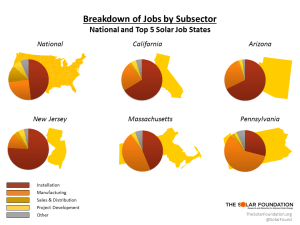
The Solar Foundation is making it easier to track solar jobs with the State Solar Jobs Map, an interactive online tool showing job numbers for all 50 states.
Over 119,000 Americans have a job in the solar industry, and with a 13.2 percent increase in employment in the past year, the industry is quickly becoming one of the fastest-growing industries in the country.
The interactive map breaks down solar employment at the state level, providing information on the size of industry subsectors and shows users how their state stacks up to others on issues like key solar policies, jobs per capita, and number of homes powered by solar energy.
The State Solar Jobs Map provides a singular insight on the growing industry, apart from the numbers. The report noted that California has more solar jobs than actors, and Texas has more solar workers than ranchers.
“We are anticipating that solar jobs are going to continue to increase at the national level,” said TSF executive director Andrea Luecke. “These jobs figures demonstrate that the U.S. solar industry remains a powerful source of local job creation.”
The Solar Energy Industries Association predicts significant job growth as well – by supporting 440,000 permanent jobs by 2016.
California led the nation in solar jobs in 2012 followed by Arizona, New Jersey, Massachusetts, and Pennsylvania, proving that abundant sunshine is not necessarily essential for a strong solar market. In New Jersey, top jobs include installation, manufacturing and project development.
Although the top states don’t catch the same amount of rays, what they have in common is policy tools that support renewable energy and solar in particular, including green building and energy efficiency initiatives.
It’s also getting cheaper to install solar, which is key to company growth, according to the U.S. Solar Market Insight Report. The top solar jobs states all saw a significant decrease in residential and non-residential costs of installation, and 31 percent of employers agree that price declines drive growth.
“People want solar, people like solar, but the upfront cost has been an issue,” Luecke said. “But the declines in component prices are helping to make the installed costs much lower, and now companies can pass along the savings to the consumer.”
As solar becomes a competitive energy source for more Americans, it continues to grow the economic opportunities from east to west coast.
The Solar Foundation is a national 501(c)(3) nonprofit founded in 1977 that works to increase the widespread adoption of solar energy through educational outreach, policy research, and market transformation.

